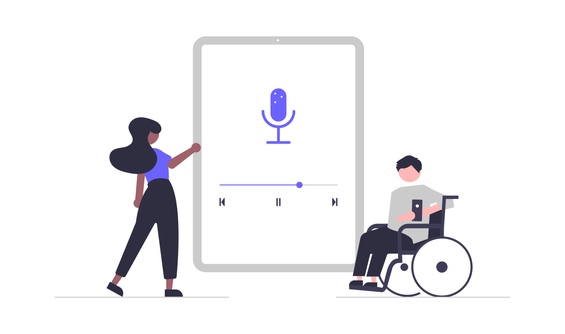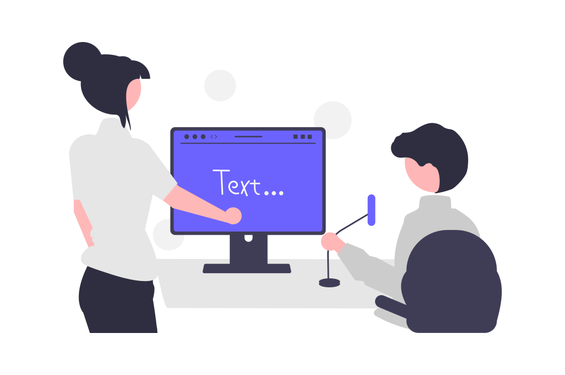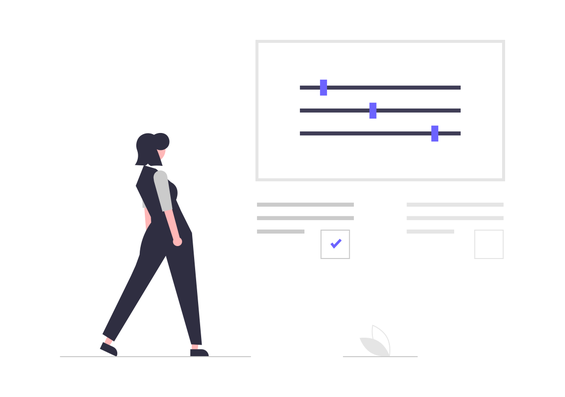Academic Accommodations

Academic accommodations are legally-mandated modifications, adjustments, auxiliary aids, and/or services that give disabled students an equal opportunity to the learning objectives of their courses.
Instructors have the right to adjust their academic policies to fit students’ individual circumstances, but these adjustments are made solely at the instructors’ discretion and should not alter the fundamental nature of the college’s academic program or provide inequitable treatment of students.
The following accommodations may be listed in a student's accommodation letter. Each student will have a unique combination of accommodations specific to the limitations they experience.
On this page:
Regular Check-ins & Instructions / Directions
Alternative Format for Course Materials
Audio Recording / Note-Taking Assistance
Assignment Extensions or Accepting Partially Complete Assignments
Advanced Notice if the class is meeting outside the regularly scheduled space
Note to students - the interactive process requires students to meet with us before accommodations are approved. Disability Services professionals will be able to approve accommodations through this process and the following listed accommodations are only listed as a point of reference. You are not entitled to accommodations you have not been approved for. Students should contact Access / Disability Services as soon as possible because accommodations are not retroactive.
Regular Check-ins & Instructions / Directions

REGULAR CHECK-INS
The student may require regular check-ins with the instructor to ensure that the student stays on track to complete assignments on time. If needed, the student will schedule individual time with the instructor to request additional assistance and feedback on progress.
INSTRUCTIONS / DIRECTIONS
The student may require:
- written instructions,
- repetition of oral instructions/directions,
- additional explanation of assignments and other course requirements.
If needed, the student will schedule individual time with the instructor to request additional explanations and/or feedback on progress.
Alternative Format for Course Materials

The student will be offered direct access to the required readings (published textbooks) in the alternative, accessible formats of their choice through the use of https://bookshare.org/. The instructor or student must email access@cca.edu the book title, author, and ISBN to receive access.
Students may also use the text-to-speech software speechify.com to convert onscreen text or documents to spoken words.
If the course material is not accessible, please notify access@cca.edu. We will ask the instructor to reconsider using inaccessible material and refer them to our Universal Design for Learning guide.
For Student:
- Login: https://app.speechify.com/
- How to use: Video Playlist
(Visit Help Guide for support)
Audio Recording / Note-Taking Assistance

AUDIO RECORDING
The student may use an audio recorder (laptop or phone) for lectures, labs, or studios. (Recorded material will be used only for successful course completion and not for duplication and distribution; sharing materials without consent may violate the Student Code of Conduct.)
- Students understand that audio-recording of class sessions is for no other use than for their personal studies and note-taking ONLY.
- Students agree that these recorded class sessions may not be distributed to or shared with others, including other students, by any current or available method.
- Students are aware that the information contained in the recordings of classes may be protected under copyright and intellectual property laws.
- Students agree that these recordings may not be copied, posted, distributed, published, or quoted in whole or part without the instructor’s and/or classmates’ written consent and without properly identifying and crediting the speaker.
- Students will consider turning off the recording device when highly sensitive or personal material is being discussed or when requested to do so by an instructor or a classmate during such a class session.
- Students understand that they can continue to record if they believe it is necessary for study purposes.
NOTE-TAKING ASSISTANCE
The student will be given access to the software https://notetakingexpress.com/. This software allows the student to upload audio recordings of the class, to be transcribed into notes sent directly to the student.
For Student:
- Login: https://ntehub.com/Account/Login?returnUrl=%2F
- How to use: Video Playlist
(See NoteTaking Express Guide for more information)
Testing Accommodations

If needed, the student will make arrangements with the Instructor at least one week before the original test date for the testing accommodation(s) indicated below:
- Additional time for in-class quizzes, tests, exams (specified on accommodation letter)
- Alternate testing site with a limited amount of external distractions
Breaks / Preferential Seating

BREAKS
This accommodation intends to provide equal access to learning for disabled students. By allowing a short period for these students to prepare themselves mentally and physically, we are enabling them to be more present, focused, and engaged during the course.
The student is allotted the following time periods in addition to breaks offered by the instructor.
- One 10-minute break during courses/studios that meet up to one and a half hours,
- One 15-minute break during courses/studios that meet up to three hours,
- Two 15-minute intervals during courses/studios that meet up to six hours.
PREFERENTIAL SEATING
Please allow the student to select a preferred seat to allow them access to the educational material. The student should notify the instructor of their preference so the instructor may assist in reserving the space for the student.
PREFERENTIAL SEATING with SERVICE ANIMAL
Please allow the student to select a preferred seat to allow them access to the educational material. The student should notify the instructor of their preference so the instructor may assist in reserving the space for the student.
Certain students may find it beneficial to take a brief break at the beginning of class. This is not a matter of convenience but a necessary step to ensure they can enter the learning environment optimally, ready to engage with the class material and participate effectively. If essential learning objectives are typically addressed at the start of your course, this accommodation might require some adjustments. Please contact Disability Services at access@cca.edu to explore alternative solutions in those cases.
Assignment Extensions or Accepting Partially Complete Assignments

Meeting deadlines is considered an essential component of the curriculum. However, extended time on course assignments may be a reasonable accommodation in certain situations because a medical or clinical condition poses challenges in completing assignments by deadlines with short notice.
Due to a documented disability that is episodic or chronic, the student may need additional time (up to 48 hours) to complete and submit written assignments or studio projects on occasion. If extra time is required, the student must contact the instructor to arrange and agree on a new due date/time before the original deadline. This accommodation does not apply to group projects or in-class presentations.
This accommodation applies only under the following circumstances:
- An assignment was not listed on the syllabus initially and is given to students with one week or less to complete;
- The assignment deadline is listed on the syllabus, but the student did not get the necessary information to complete it until there is one week or less before the deadline;
- An unexpected medical or physical episode interferes with the student’s ability to complete the work in the expected timeframe.
- Some studio coursework may benefit from partially completed assignments, so students do not lose valuable in-class time to work on assignments. Students should work with their instructor beforehand to understand what works best to meet the course’s learning objectives.
Student Responsibilities When Eligible for Assignment Extensions
- Students need to opt-in to their approved accommodations each semester to use them. Opting in will create a new letter for that semester using the date the opt-in form was submitted.
- Students must collaborate to determine the reasonability of Assignment Extensions within the context of each class by either:
- Initiating contact with your instructor to discuss the boundaries of the accommodation and developing protocols for how it will be used OR
- Requesting guidance from access@cca.edu; so we can contact the instructor to determine the boundaries of the accommodation and any necessary protocols.
- Student should clearly understand if or how assignment extensions will be granted in light of the class learning objectives and structure. This entails knowing the finite number of extensions that can be allowed, how to communicate with the professor when they need to request an extension, and any critical assignments that cannot receive an extension.
- When a student needs to utilize this accommodation for an upcoming assignment, they are responsible for reaching out to the instructor through email as early as reasonably possible to request the extension and clarify a new due date.
- At no time are students required to present documentation to instructors in order to justify a disability-related need for an extension.
- Students should not plan on the extension being automatically provided and should always use this accommodation, if available, with care.
- If a student receives a paper or assignment extension and is unable to meet the deadline, a new extension request must be made.
Email access@cca.edu for additional support or any questions you may have.
Student Email Templates
Coordinating Accommodation Agreements Early in the Semester:
Dear Professor ______,
My name is ________ and I am a student in your _________ class. I am writing to share my accommodation letter with you and to discuss the accommodations outlined in it. I would like to proactively explore how my accommodation for assignment extensions may work in your class.
If and when I need an extension for disability-related reasons, I will contact you before the assignment due date to initiate my request. Typically, I may need 2 additional days to complete an assignment and I will request a new due date within this timeline. While I can’t always predict when my disability will impact me, I will provide as timely notice as possible when I need an assignment extension.
Please let me know if there are any assignments in which an extension would be unreasonable or alter the learning experience so that I know in advance.
Thank you for your assistance and support. I have also cc’d access@cca.edu on this message if you have any questions or concerns about my accommodations.
Sincerely,
_____________
Email Notifying Utilization of Assignment Extension
Dear Professor ________,
I am enrolled in your class (class name and section). Earlier this semester we discussed my Accommodation Letter indicating my eligibility for assignment extensions as an accommodation. Due to disability-related reasons, I am unable to submit (assignment name) by (date).
I’m writing to you to ask for an extension of 2 days on this assignment. If this is reasonable, I will submit the assignment by (new due date). Please let me know if this new deadline would work within your course objectives.
If you have questions about my accommodations, please let me or access@cca.edu know.
Thank you in advance for your consideration,
_____________
Advanced notification if the class will meet outside of the regularly scheduled classroom space
Instructors should offer advanced notice to the student when the class will meet outside the regularly scheduled classroom space. The notice should include enough time for the student to look into accessible pathways, restrooms, transportation, etc.
Examples of barriers this accommodation might mitigate:
- Students with physical disabilities might require accessible transportation, such as buses equipped with wheelchair lifts.
- The destination might have uneven terrain, stairs, or lack ramps, making navigating difficult for some students.
Note: View Field Trips & Accessibility PDF Resource
Attendance Policy Modification
Attendance is considered an essential component of the curriculum. However, in some cases, a student's disability may include symptoms that could exacerbate unexpectedly, causing the student to miss, leave or be late to class. This modification of attendance accommodation is intended to provide reasonable modification to the classroom attendance policy; it is not intended to serve as an attendance waiver.
Missing classes may still negatively impact a student's academic performance regardless of this accommodation. This accommodation allows students to discuss what may be possible in light of an absence with their instructor. Too many missed classes may not allow the student to achieve the course's learning objectives.
This accommodation does not modify the learning objectives, which may include in-person work during class that could not be made up. This accommodation allows modification of the attendance policy according to the class requirements; it is not open-ended. Agreements between the student and instructor can be facilitated by Access / Disability Services, and should always be documented.
Who is eligible for this accommodation?
Students with a documented disability that occasionally impacts their ability to attend classes because symptoms may exacerbate unexpectedly or must attend frequent medical appointments (pregnancy-related, radiation therapy, dialysis, etc.).
When is this modification to the attendance policy not reasonable?
In general, if the class is mostly lecture-based, the in-class experience focuses on reviewing content available in the text or from instructor/peer notes and involves little student interaction during class, then more flexibility with excused absences and/or participation points is reasonable.
However, there are various classes in which this accommodation would not be reasonable. Attendance could be critical to the learning objectives of the class for those that utilize significant in-class participation/interaction as a method of instruction, classes where student learning is created/assessed in the classroom through experiential or conversational means, and classes in which absences would compromise the educational experience of other students in the class. In these situations, less flexibility with excused absences and/or participation points is reasonable.
What should a student do about extended absences?
When students face medical challenges that could leave them absent for longer than 1/4 of the term period, Access / Disability Services recommends withdrawing from the course(s) and taking a Leave of Absence until their medical issues are resolved.
For medical procedures or other disability-related reasons for an extended absence (not longer than 1/4 of the term period), a doctor's note should be documented with Access / Disability Services so they can notify your instructors of medically excused absence.
When possible, students should always notify instructors of an absence before class begins.
Policy References from Student Handbook:
Trigger Warnings

The student may request trigger warnings regarding matters shared by the student with the instructor. The trigger warning should offer sufficient time for the student to take their break, then re-engage with the class afterward.
Alternative Assignments

Depending on the student's needs, the student may need to work on an alternative assignment to meet a particular learning objective. Students and instructors are welcome to schedule consultations with access@cca.edu while creating alternative assignments.
Live Captioning and Sign Language Interpreting

Live Captioning/CART
CART, also known as Communication Access Real-time Translation, is a speech-to-text service that uses a professional captioner in order to provide a text format for auditory information (such as your professor’s voice in a classroom lecture). This captioner uses specialized software and a display device in order to capture all spoken information and type it in near-real time so that you as the student are able to read the lecture or class discussion on the monitor. Live captioning is extremely accurate and only has a 2-3 second delay.
Disability Services offers two kinds of CART, in-person and remote. With in-person CART, a professional captioner is physically in the classroom with you, listening to all audio content in the room and converting it to text on a computer monitor. Remote captioning is also an option, using a small, discrete microphone to send the audio content to a captioner who is not physically in the room.
Sign Language Interpreting
For students who prefer Sign Language as their method of receiving information, the OAE offers in-person and remote options in American Sign Language, Pidgin Signed English, and Signed Exact English. With in-person interpreting, a professional interpreter will be in your classroom with you, usually at the front of the classroom so that you can observe both the interpreter as well as any media content that the professor is displaying (for example, a powerpoint presentation.) Remote interpreting is also an option, wherein the interpreter uses a small, discrete microphone in order to receive audio content. You as the student are then able to view the interpreting through your own computer.
Advanced Notice is needed for Disability Services to coordinate this accommodation. Similarly, it is the student's responsibility to notify Disability Services regarding any issues experienced with these services.